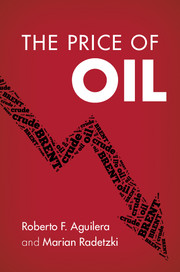Book contents
- Frontmatter
- Contents
- Figures
- Tables
- Acknowledgments
- 1 Introduction and overview
- PART I OIL'S EXTRAORDINARY PRICE HISTORY: HOW CAN IT BE EXPLAINED?
- PART II THE SHALE AND CONVENTIONAL OIL REVOLUTIONS: LOW PRICES AHEAD
- PART III GLOBAL IMPLICATIONS FOR THE MACROECONOMY, THE ENVIRONMENT AND FOR POLITICS
- 13 Impact on macroeconomy and trade balances
- 14 Climate policy with low oil prices
- 15 Political repercussions
- CONCLUSIONS
- References
- Index
13 - Impact on macroeconomy and trade balances
from PART III - GLOBAL IMPLICATIONS FOR THE MACROECONOMY, THE ENVIRONMENT AND FOR POLITICS
Published online by Cambridge University Press: 05 November 2015
- Frontmatter
- Contents
- Figures
- Tables
- Acknowledgments
- 1 Introduction and overview
- PART I OIL'S EXTRAORDINARY PRICE HISTORY: HOW CAN IT BE EXPLAINED?
- PART II THE SHALE AND CONVENTIONAL OIL REVOLUTIONS: LOW PRICES AHEAD
- PART III GLOBAL IMPLICATIONS FOR THE MACROECONOMY, THE ENVIRONMENT AND FOR POLITICS
- 13 Impact on macroeconomy and trade balances
- 14 Climate policy with low oil prices
- 15 Political repercussions
- CONCLUSIONS
- References
- Index
Summary
Chapter 2 presented a table that demonstrated the importance of oil in the world economy, and noted that the heavy economic weight of this commodity implied important macroeconomic repercussions from oil price changes, but we decided to save a discussion of that link for later. Now has come the time to disentangle the relationship.
A number of academic studies on oil price shocks and the macroeconomy have been published over the past several decades, and these have been supplemented by ambitious analyses launched by international organizations – the IMF and IEA being in the forefront.
Our deliberations begin by reviewing what has been learned in the many studies on the subject, and what still remains unclear. We then assert that these studies and the conclusions they reach are of limited relevance to the issue in focus of our interest, and we explain the reasons for our skepticism. Finally, we proceed to a brief but surprising intuitive discussion of how the global economy is likely to be affected by the very sizable but likely gradual oil price reduction that we envisage will occur over the next 20 years.
STUDIES OF OIL PRICE SHOCKS AND THE MACROECONOMY: THE MAIN FINDINGS
Writing in 1983, James Hamilton noted that US recessions since World War II have been typically preceded by dramatic increases in the price of crude oil (Hamilton, 1983). This statement was repeated in 2005, when the author asserts that nine out of ten of the US recessions after 1945 followed on spikes in oil prices (Hamilton, 2005). The causality from oil prices to recessions was suggested in his data by recessions emerging on average with a lag of nine months upon the oil price change, and it is reinforced by the author's econometric investigations intended to isolate the impact of oil prices from other disturbances of the macroeconomy. Hamilton's analysis was broadened by Mork (1989), who, intriguingly, failed to ascertain the obverse relationship – oil price collapses speeding up GDP growth, suggesting an asymmetry in economic reactions to rises and falls in oil prices. Later studies extended the analysis to countries other than the US, to the effect on variables other than GDP change (e.g., inflation, current account and employment) and to the shifting strength of the impact over time.
- Type
- Chapter
- Information
- The Price of Oil , pp. 173 - 183Publisher: Cambridge University PressPrint publication year: 2015



